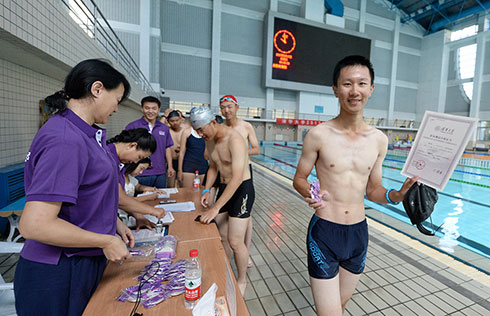Policy digest
Support given to Shanxi's economic transformation

Shanxi province was granted more support from the central government to achieve economic transformation as an energy resource-based economy, according to a guideline released by the State Council on Monday.
The document set goals on establishing a mechanism to bolster the economic transformation of Shanxi by 2020, when more coalmining and processing will be cut off, with advanced production capacity to increase by two-thirds of overall industrial value-added output.
By 2030, the region will set up a clean, safe and efficient modern resources system with support from many other industries to complete the transformation of the resource-based economy, according to the guideline.
Local governments are required to overhaul resource supplies and consumption, with efforts to guide cutting overcapacity, optimizing the industrial structure of energy resources and expanding the use of clean energy, including natural gas and hydropower.
The State Council also encouraged enterprises in coal, electricity, and transportation and other industries to conduct corporate restructuring or cross-shareholding, which will increase competitiveness.
The provincial government was encouraged to implement the strategy "Made in China 2025", which will focus on emerging industries in areas such as information technologies, new energy vehicles, aerospace and biological medicine. It was also urged to build a green manufacturing system, which targets transforming traditional industries to a greener and more environmental-friendly mode of operation.
The document also urged building demonstration bases in mass entrepreneurship and innovation, expand mixed ownership reform of State-owned enterprises, and promote the healthy development of the private economy.
Money laundering and terror financing targeted
China will strengthen efforts to curb money laundering, terror financing and tax evasion, as part of its endeavors to build a modern system of financial regulation and stability, according to a guideline released by the State Council on Wednesday.
The guideline said the law and regulation system will be improved by 2020, with a coordinated regulation mechanism to be set up to effectively prevent and control these types of illegal operations.
The country will improve its trans-ministry focus to combat money laundering, establish a national risk assessment system on money laundering and terror financing, and set up a panel for regular assessment.
The nation will optimize cooperation in combating money laundering and improve related investigations and technologies and supervision.
The document encouraged exploring standards for data-sharing and setting up databases to fight money laundering, terror financing and tax evasion.
Legislation should be improved and the resolutions on anti-terrorism financing passed by the UN Security Council should be enforced, the document said.
The guideline urged to further enhance monitoring on irregular cross-border capital flows to prevent and combat financial crimes. In addition, China will launch a special operation nationwide to crack down on tax evasion. The document also said joint efforts will be made to prevent customs duty evasion by anti-laundering and customs authorities.
Reforms in innovation to be piloted in selected areas

Thirteen measures will be piloted in eight innovation demonstration zones, including the Beijing-Tianjin-Hebei city cluster, Shanghai and the Pearl River Delta in Guangdong province, according to a guideline released by the State Council on Thursday.
As part of financial innovation, one-stop services for investment and financing information will be provided to small and medium-sized enterprises.
To create a beneficial environment for innovation and entrepreneurship, another one-stop service will be performed for quick approval, ownership confirmation, and patent applications.
An innovation-driven assessment in State-owned enterprises will also be implemented while the taxes levied by the central and local governments will be integrated.
In addition, international students and high-quality foreign expertise are welcomed to work in China, and their applications for residence permits will be facilitated.
Private investment to be encouraged in PPP projects
Private businesses are encouraged to join public-private-partnership projects while a new mechanism will be established to ensure returns, according to a State Council guideline released on Friday.
This was part of the slew of measures China has released to improve government services and offer more financing channels to encourage private investment as the sector has seen slowing growth.
Other measures also include delegation of governmental powers and strengthened regulation. The guideline attributed the slowing growth of private investment to sloppy implementation of government policies, high institutional costs and limited access to financing.
The document said the government will improve the credit rating system for private businesses and better manage their credit extensions, which will give them more channels to get financed.
The nation will also reduce costs for private companies and encourage them to take part in projects under major national strategies such as "Made in China 2025", modern agriculture and technological upgrading, the document said.



























